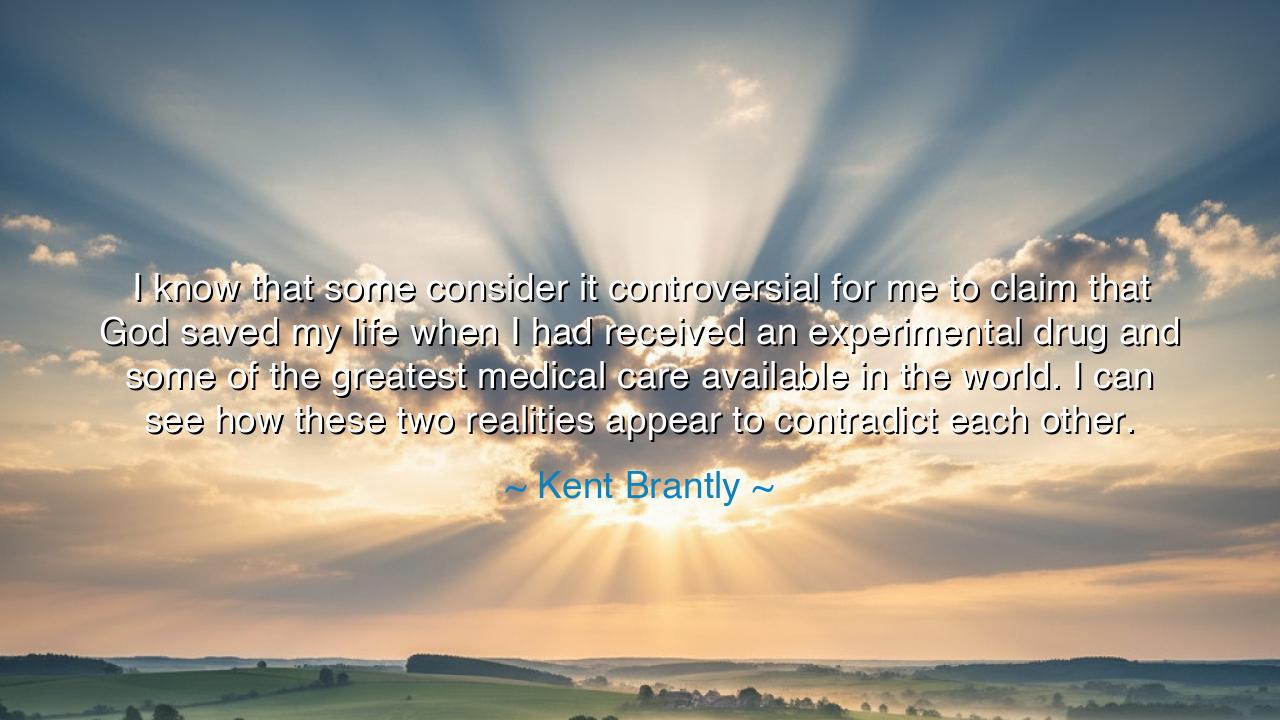
I know that some consider it controversial for me to claim that
I know that some consider it controversial for me to claim that God saved my life when I had received an experimental drug and some of the greatest medical care available in the world. I can see how these two realities appear to contradict each other.






Hear, O seekers of truth, the words of Kent Brantly, who walked through the valley of death and returned: “I know that some consider it controversial for me to claim that God saved my life when I had received an experimental drug and some of the greatest medical care available in the world. I can see how these two realities appear to contradict each other.” In these words is a profound tension, a paradox at once spiritual and scientific. He speaks of God, of experimental drug, of medical care, as though three threads pulled in different directions—yet he insists they all wove together to preserve his life.
This quote arose from Brantly’s near-death struggle with the Ebola virus in 2014, a plague that swept through West Africa with terror and fire. As a missionary doctor, he had gone to heal others, only to be struck himself by the very disease he sought to fight. At death’s edge, he received both the tender care of skilled physicians and the untested drug ZMapp, a therapy still in its earliest stages. Against all odds, he lived. And in his survival, he saw not contradiction, but convergence: that faith and medicine are not rivals, but companions.
The ancients, too, knew this tension well. In Egypt, the priest and the physician were often one, invoking both prayer and poultice. In Greece, Hippocrates taught the power of observation and remedy, yet the people still lifted their eyes to Apollo, the healer-god. Humanity has always walked this line between the divine and the practical, between the unseen hand of providence and the visible hand of human skill. Brantly’s words echo this ancient tradition, refusing to sever what has always been intertwined.
Consider the tale of Ignaz Semmelweis, the physician of the 19th century who discovered that simple handwashing could save mothers from death in childbirth. Though scorned at the time, his insight later transformed medicine. Was it mere human reason that revealed this? Or was it also a spark of grace, guiding him toward a truth that would save countless lives? The line is thin, and perhaps unnecessary to draw sharply. For as Brantly suggests, it is possible that both divine providence and human science worked together.
The meaning of Brantly’s statement is thus not to diminish science, nor to claim miracles in defiance of medicine, but to honor both. He acknowledges the medical care that was among the finest in the world, and the drug that bore the fruits of human discovery. Yet he also insists that his survival was not chance alone, but part of a greater mystery—an answer to prayer, a divine act woven through human hands. He teaches us that to see God in healing is not to deny medicine, but to see medicine itself as a gift.
The lesson is clear: we must not divide where unity is possible. Those who trust in faith should not scorn science, and those who honor science should not dismiss faith. In times of trial, let us embrace both the medicines crafted by human intellect and the prayers whispered by human hearts. For together, they form a shield stronger than either alone. Just as the body and the soul are not enemies, but two halves of one being, so too are faith and science allies in the quest for healing.
Practical action follows this wisdom: when illness strikes, seek both the physician’s care and the solace of prayer. Support the advancement of medical discovery, for it is through such work that lives are preserved. But also cultivate gratitude, humility, and faith, acknowledging that life itself is fragile and precious beyond human control. In this way, whether in sickness or in health, you will walk the path of balance, honoring both heaven and earth.
Thus Brantly’s words ring out like a testimony for the ages: that the power of God and the power of medicine are not contradictions, but companions. Let us carry this truth into the generations to come—that when the darkness of disease surrounds us, we may draw strength both from the wisdom of healers and from the mystery of the divine. For in the union of these two, hope endures, and life triumphs.






AAdministratorAdministrator
Welcome, honored guests. Please leave a comment, we will respond soon